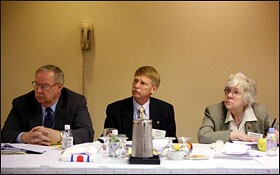The No Child Left Behind Act hampers states’ ability to help thousands of small and rural school districts, imposing constraints that federal lawmakers should consider lifting as they discuss the law’s reauthorization, educators from predominantly rural states said at a meeting here last week.
“The federal government should supplement and support rather than dictate state efforts in education,” says a legislative agenda put forward by the National Rural Education Advocacy Coalition, an umbrella organization that includes the National Rural Education Association, the American Association of School Administrators, and state-level rural education groups.

The statement outlining the coalition’s 2007 legislative priorities urges that federal efforts “focus on program improvement for schools and districts that need assistance rather than on one-size-fits-all sanctions that do not meet the unique needs and challenges of rural schools.”
Scott R. Palmer, a lawyer with the Washington-based law firm of Holland & Knight and a consultant for the Council of Chief State School Officers, said the concern extends beyond traditional farm states and districts.
“This is an issue for all state chiefs because almost every state has small and rural schools,” Mr. Palmer said in an interview.
Compliance Challenge
Rural educators also say that the isolation of most rural schools can make it difficult, if not impossible, to comply with the law’s consequences for failing schools, which can include the offer of public school choice and tutoring.
For example, Wyoming, which has 48 districts and 362 schools spread out over nearly 98,000 square miles, has three supplemental-educational-service providers approved by the state, according to a March 2 letter from the state’s superintendent of public instruction, Jim McBride, to U.S. Sen. Michael B. Enzi, a Wyoming Republican who is an outspoken proponent of altering the NCLB law to help rural schools.

But “none of these [service providers] have shown real promise in addressing the needs of our struggling districts,” the letter says. “The solution … will likely come from aggressive staff-development activities, community support, and technical-assistance visits from my staff.”
Increased responsibilities for state education department staff members under the 5-year-old law are especially a burden for states like Wyoming, which is large in area but has a small education department, Mr. Palmer said.
“What do you do in a state where you can look around the room and see everyone in the education department?” he said.
Mr. Palmer and others note that small populations in rural communities and states also make for small student-testing pools, which can make it hard to judge with certainty whether or not schools are meeting achievement targets, or adequate yearly progress.
“In small schools (and districts), even the overall number of test scores is often far below the minimum number for AYP accountability,” says a 2003 report that Mr. Palmer wrote for the CCSSO. “Indeed, in some states, the majority of schools fall into this category.
The rural educators are urging lawmakers to modify the AYP requirements to reflect the needs of small schools and districts.
Teacher Requirements
Among the other challenges, rural educators say, is finding enough teachers rated as “highly qualified” under the federal law to staff schools in isolated communities.
Under the law, all teachers of core subjects are supposed to be highly qualified, meaning they hold a standard state teaching license and have demonstrated knowledge of the subjects they teach. Certain rural schools are exempt from the requirement, although some educators argue that the federal government’s definition of “rural,” based on population density and district size, is too narrow.
Rural administrators contend that limited budgets often prevent small schools from hiring separate teachers for each class and, therefore, teachers often teach multiple subjects, such as biology, chemistry, and physics. The federal government should not set specific teacher standards, the NREAC statement says, because “states are more aware of the unique circumstances that face multiple-subject and other types of teachers in rural America.”
Other changes rural administrators would like to see in the NCLB law include: reducing the minimum number of students required for subgroup reporting; adopting “growth models” to measure student progress; judging schools solely on the performance of students supported by federal money; and exempting from federal scrutiny special education students and English-language learners. In particular, the number of English-learners in rural areas has increased dramatically since implementation of the law began after its signing by President Bush in 2002.
“The key to our … state’s success will be the allowance for maximum financial and academic flexibility,” Mr. McBride’s letter says, echoing the sentiments of many other educators in predominantly rural states.
Regardless of increased flexibility, however, success will be difficult for small schools unless the law is fully funded, rural educators say, especially the section that provides money for schools based on their enrollment of students from low-income families. In particular, they emphasize the importance of Title I, the federal government’s primary program for aiding disadvantaged K-12 students.
“Title I is so critical to rural schools,” Joseph Bard, the executive director of the Pennsylvania Association of Rural and Small Schools and the chairman of the NREAC, said at last week’s meeting.
Unfortunately, Mr. Bard and others argue, the formula to allocate Title I money tends to target concentrations of low-income families, rather than percentages of poverty in districts. As a result, they say, larger, urbanized districts receive more money per pupil than do the smallest rural districts even though studies have shown that 35 percent of rural students live in poverty.
“If 30 percent of our kids go to rural schools, we’re talking about a lot of poor kids,” said Mr. Bard. “Those kids are being left behind.”




